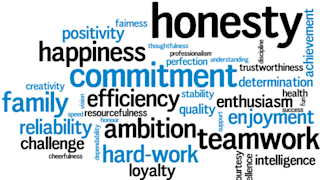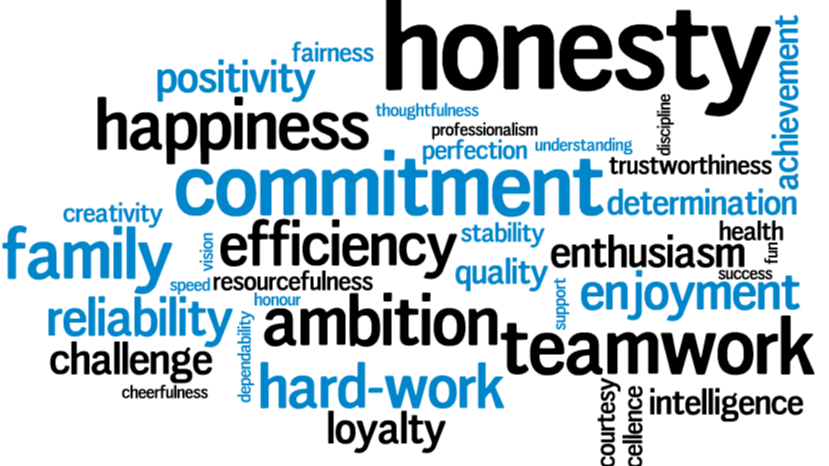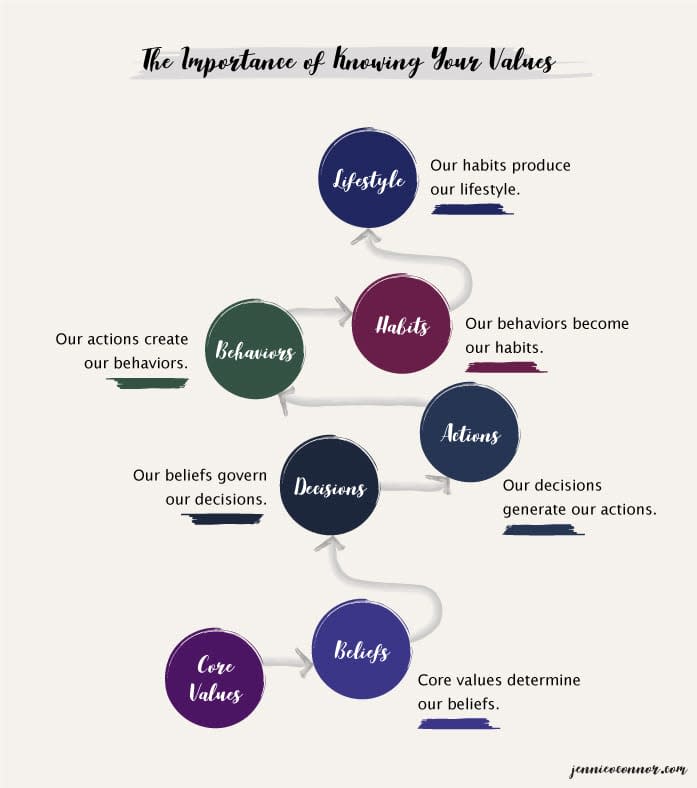
10 Easy Ways to Identify Your Personal Core Values
Apr 14, 2023
By Will Moore
Your personal core values shine through in everything you do. These choices, lifestyles, and even your career are all affected by your common core values. Therefore, it is important to identify core values.
Each value is “the thing” that makes you tick. It keeps you going when life gets hard and you need something to hold onto. Your core values give your life meaning high value, purpose, and direction.
Figuring out what those values are is an exciting process of getting to know yourself. It's also the first step to making key life changes and achieving true success and happiness.
What are Personal Core Values?
A personal core value is a foundational perspective, belief, or desire that drives your lifestyle, behaviors and decisions.
It is what you believe to be true and can be used to guide all aspects of your life. A core value is not a specific goal or achievement. In fact, it is an underlying belief that directs all of your goals and achievements. These values will help you to accomplish goals.

Core values are at the heart of what makes you who you are. They define your identity and give meaning to your life.
Being aware of and acting in accordance with your core values is key to finding joy, freedom, authenticity, growth, happiness, and success.
Does Everyone Have Personal Core Values?
The answer to this question depends on who you ask the following question to. On the one hand, anyone living makes decisions and thinks a certain way; thereby, indicating that they have some set of core beliefs that fuel those choices and mindsets.
But it might be more accurate to say that core beliefs may not be the same as core values.
For example, you can have core beliefs informed by trauma or default thinking. And as you become more self-aware, you realize that those beliefs don't match your values. That's how change begins for most people. And this is one of the main dilemma for the faith driven entrepreneur.
Personal core values are always intentional. It's frequent for your core beliefs to clash with your core values, which is why striving to be your best self necessitates introspection into who you aspire to be and what you aim to accomplish in life, frequently necessitating modifications to your beliefs and behaviors. This also emphasizes the significance of personal core values in life.
In summation, everyone has core beliefs, but that doesn't necessarily mean that they've identified their core values. More importantly, just because someone has identified their core values doesn't mean that they are rejecting their wrong core beliefs and living according to the best version of those values.
Defining your Important Core Values:
Defining your personal core values is an IMPORTANT step towards understanding who you are and what truly matters to you in life. These values serve as the guiding principles that shape your decisions, actions, and behaviors in daily life. They reflect your deeply held beliefs and convictions, and they provide a moral compass for navigating the complexities of the world.
Personal core values can cover a wide range of aspects, including honesty, integrity, compassion, resilience, creativity, growth, or any other qualities that resonate with your authentic self. By identifying core values, you gain clarity on what brings you fulfillment, enables you to make choices aligned with your principles, and empowers you to live a meaningful and purpose-driven life.
Your personal core values become the foundation upon which you build your relationships, pursue your goals, and make a positive impact on the world around you.
Can You Change Your Personal Core Values?
There is no clear answer to this question. One's core values are deeply personal, and it is up to that individual to determine whether they feel they can or should change those driving forces they hold most dear.
But returning to this idea of core beliefs, it is necessary for you to change some of your core beliefs if you want to live according to your values. Doing so can be difficult for most people, but here are a few ways you can uncover bad core beliefs and align better to your core values:
Work with a licensed psychotherapist. These professionals are trained to expose trauma responses and attachment issues that often conflict with who you want to be. They can also help you uncover your core values (as we will discuss in a bit).
Identify and replace your bad habits. Your bad habits come from poor core beliefs. By taking active steps to break them, you will also change your core beliefs and develop keystone habits.
Practice mindfulness. This theme of mindfulness is going to come up a lot in this blog. Making headway with your core values, beliefs, and habits means knowing yourself. Mindfulness is the practice of being present in every moment without judgment. It's a skill that takes time and effort to develop but can be incredibly powerful in helping you uncover new insights about yourself.
Your 5 Cores - Core Values List
At Moore Momentum, we categorize your personal values into 5 areas of life:
Mindset
Career and Finance
Relationships
Physical Health
Emotional Health
By segmenting your values in this way, you're able to build new habits in a balanced way and achieve true happiness in daily life.
Why Do Your Personal Core Values Matter?
Taking time to know and live by your values might seem superfluous, particularly if you feel busy and overwhelmed with how hard life can be. But in truth, so much about your life will be difficult when you're not living according to your values.

You'll feel a lack of purpose, a sense that your personal life somehow is out of alignment. You'll be frustrated by the things you do that are at odds with your values. And you'll feel bad about yourself for not living up to your own standards. Worse, you'll often feel these negative feelings and not know why until you do the work to identify your personal core values.
Your values impact everything in your life.
They dictate how you make difficult decisions.
They help you navigate the choppy waters of life, where there are no easy answers or you are feeling like a failure in life. They keep you focused on what matters most to you and help you make choices that are consistent with your values.
Your values guiding principles are your compass. They're what help you navigate through life, making difficult decisions and staying true to yourself.
They control how you handle conflict.
Values help you process other people's responses to life, particularly when those responses impact you. They inform you on the correct course of action toward reconciling with, separating from, habit formation or befriending others.
Read About how can managing your personal life help with reaching your goals?
Depending on your values, you may choose to handle some problems diplomatically or abruptly. And you'll likely manage each conflict differently depending on how your personal values affect and shine through in different situations.
They make it easier or harder to find joy in life.
When we have clarity about our own values, we are more likely to find joy in our daily lives because we know what makes us happy and what doesn't. We're also more likely to be able to recognize when things aren't going well—and take steps toward finding solutions instead of getting stuck in frustration or anger.
They help us be more fulfilled in our work. When we know what's important to us, it becomes easier for us to choose jobs that align with those same values too. The same is true for relationships, hobbies, and goals.
They influence your habits.
Perhaps the biggest reason why values are so critical is that they drive your habits. What you hold most dear dictates what you spend time and money on, as well as when you choose to take action or rest.
10 Simple Approaches to Identify Core Values in Life
It doesn't have to take a midlife crisis for you to figure out what your values are and how well you live by them. It's a good idea to do this periodically, and it can be helpful at any stage of life. Most people don't know what their core values are, or they aren't sure how to live by them. It's not uncommon for some people to feel like their lives are out of balance because they're not living according to their values.
Here are ten great ways to identify personal core values.
1. Reflect on those moments in life when you were most proud of yourself.
What were you doing? What was the situation like? How did you feel? When we reflect on these moments, we can begin to uncover our core values.
When you're living according to your values, you will always feel good about yourself. Reflecting on past moments of personal triumph and pride helps you understand who you are and why. And then you can write down those specific things that are most important to you.
2. Write down a list of people you look up to and why.
You will resonate with and feel attracted to those qualities in others that match your values. You will also feel a strong sense of disgust towards people who you see as not living up to or embracing wrong values. You may have an aversion or respect to them and even find it difficult to be around them.
Think about the qualities in other people that you admire. What makes them so admirable in your eyes? Are they kind, generous, and compassionate? Are they honest?
3. Use personal core values assessment.
A core values assessment is a tool that helps you discover what's most important to you in life. Some people find it helpful for identifying and defining their purpose in life; others use it as a guide for making decisions.
A core values assessment can take many forms, but generally, it will ask you to rank different values on a scale of one to ten. As you're answering the questions, try to be as honest as possible.
If you find yourself hesitating or struggling to answer a question, just move on to the next one. After finishing your assessment and looking over your responses, look for patterns or recurring themes. These are important signals exposing your values.
4. Find an exhaustive core values list (called a values inventory) and mark the ones that resonate with you the most.
A values inventory works similarly to an assessment, except that you won't be required to answer any questions. These values lists are great if you've already identified your values in the past and are trying to figure out how you've changed.

Simply peruse a values inventory and circle each one that means something to you. May be create personal core values list by category. Try to shrink your list to fewer than five to find out which are most important.
Next, put each value on a separate piece of paper and draw a line down the middle. On one side write "Why this value matters to me" and on the other write "How it impacts my life."
5. Ask close friends and family members what they think is most important to you.
People who know you well are perfect for helping you find out what your true self and values are, so ask them. You may be surprised by the honesty of some of their responses.
When using this approach, be careful about having your friends think for you. All you're looking for is insight, things that are apparent to those around you that you may not be fully aware of unless someone told you.
Record responses that stick out to you in a journal or notepad. Then take a few minutes to reflect on what core values in life you have that come through to others so clearly.
6. Practice mindfulness.
Mindfulness is being fully aware of your surroundings and the present moment. When you're mindful, you'll be able to focus on what's actually going on instead of getting caught up in how you feel about it.
As you practice mindfulness -- consider sitting comfortably with your eyes closed and breathing deeply -- don't try to judge any feelings that arise in you. Simply notice them.

While you go through your day, pay attention to the emotions you have and what triggered them. Don't react to your feelings. Simply let them pass by.
This kind of self-care isn't just great for dealing with anxiety and stress, it's perfect for mind wellness and helping you uncover your personal values. You'll quickly notice the things that are most important and why.
7. Consult a coach, counselor, or therapist.
Seeking professional help from a life coach for young adults isn't just for people with mental health disorders. It's perfect for anyone that wants to level up in life.
Many coaches and therapists are well-equipped to help you identify your personal core values, as well as point out parts of your life that don't align with core principles. Not only will the professional guidance help you see things you might not be able to on your own, but it will also hold you accountable to be true to yourself. You will surely end up finding out a lot of new things about your own core values in life.
8. Recall times when you felt deep love, excitement, and fulfillment.
Think of the times in your life that you felt truly excited about something. Maybe it was when you got into a good school, or the first time you saw your child smile. It could even be when someone complimented your outfit and told you how nice it looked on you. Whatever it is that comes to mind, remember how it felt to feel like this. Your values lie hidden deep within those beautiful memories.
9. Build a list of things you want to accomplish in life.
Make a list of what you want to achieve in life. These could be big goals like getting married, having children, or writing your first novel; or they could be smaller things like learning how to play the guitar or taking up jogging. It doesn't matter how small or large these goals are.
After compiling this list, go back and reflect on why you want to accomplish those things. What values drive you to want to excel in those specific ways?
10. Make a list of things you most dislike and express them as positives.
For example, if you hate to see people act rudely to strangers, express that discomfort in a positive way, "I value kindness toward others, even towards people I don't know."
Or, maybe it bothers you when you see injustice toward certain people groups. Put positively, you might say that it's important to the world around you that all people are treated equally, regardless of their race, gender, background, or disabilities.
Knowing what you don't like is a critical step in better understanding what you do like. And the things you like stem from your values.
Conclusion
You do not have to try all the techniques listed above, but you certainly can if you wish (you might even have fun doing it). There's no right or wrong way to figure out what your personal core values are because you alone will know once you've found them. You will also find out why personal excellence and core values are important.
It will take some dedication, hard work, and willingness to look inside of yourself to uncover your core values list, but it will pay off in the end. Identifying core values can be one of the most meaningful life experiences you will ever have.
